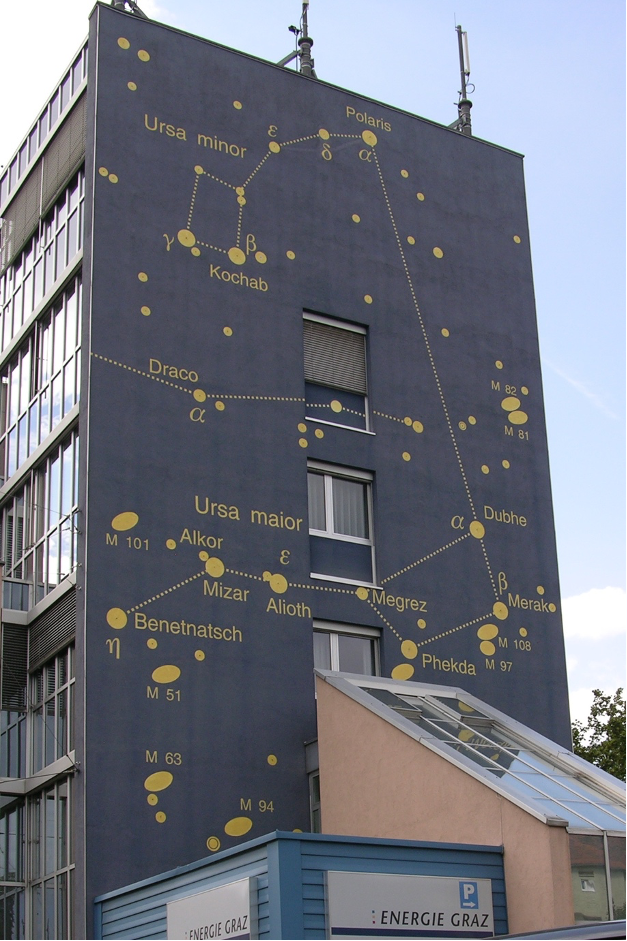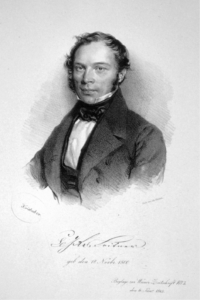The stars
(Poet's title: Die Sterne)
Set by Schubert:
D 939
[January 1828]
Wie blitzen
Die Sterne
So hell durch die Nacht!
Bin oft schon
Darüber
Vom Schlummer erwacht.
Doch schelt ich
Die lichten
Gebilde drum nicht,
Sie üben
Im Stillen
Manch heilsame Pflicht.
Sie wallen
Hoch oben
In Engelgestalt,
Sie leuchten
Dem Pilger
Durch Heiden und Wald.
Sie schweben
Als Boten
Der Liebe umher
Und tragen
Oft Küsse
Weit über das Meer.
Sie blicken
Dem Dulder
Recht mild ins Gesicht
Und säumen
Die Tränen
Mit silbernem Licht.
Und weisen
Von Gräbern
Gar tröstlich und hold
Uns hinter
Das Blaue
Mit Fingern von Gold.
So sei denn
Gesegnet
Du strahlige Schar,
Und leuchte
Mir lange
Noch freundlich und klar.
Und wenn ich
Einst liebe,
Seid hold dem Verein,
Und euer
Geflimmer
Lasst Segen uns sein.
How they glow –
The stars –
So bright through the night!
I have often,
Because of them,
Awoken from slumber.
But I do not criticise
Those light
Images for that,
They perform
(In silence)
Many healing duties.
They process
High above
In the form of angels,
They light
The pilgrim
Through heathland and forest.
They hover
As messengers
Of love all around,
And they carry
Kisses, often
Far across the sea.
They look at
The person in distress
Gently, directly in the face,
And they line
The tears
With a silver light.
And they point
Away from the graves,
With such comfort and beauty,
Directing us behind
The blue
With golden fingers.
Therefore accept my
Blessing,
You shining throng,
And enlighten
Me for a long time
With continuing friendship and clarity.
And if I
At some point fall in love,
Be favourable to the union,
And may your
Shimmering
Be a blessing on us.
All translations into English that appear on this website, unless otherwise stated, are by Malcolm Wren. You are free to use them on condition that you acknowledge Malcolm Wren as the translator and schubertsong.uk as the source. Unless otherwise stated, the comments and essays that appear after the texts and translations are by Malcolm Wren and are © Copyright.
☙
Themes and images in this text:
Blue Gold Graves and burials Heathland and moors Kissing Night and the moon Pilgrims and pilgrimage Silver Soothing and healing Stars Tears and crying Woods – large woods and forests (Wald)

Graz, the capital of Styria, is 348 metres above sea level in the foothills of the Alps, so its inhabitants, such as Leitner (the teenaged poet who wrote this text) enjoyed a clear view of the stars. In 1819 there would have been little light pollution even in the centre of a town like Graz, whereas the much larger Vienna (where Schubert set the poem to music nine years later) was already beginning to industrialise and citizens were becoming less familiar with the night sky (partly because of the newly installed gas lamps in the streets).
The stars have had a unique ability to inspire human beings with a sense of awe and mystery and at the same time a passion for detailed observation and critical understanding. Astrology (the idea that the stars have a meaning or special significance for us) and astronomy (cosmology, astro-physics etc.) have often been more closely associated than we imagine. Most of us still have a sense that the stars show us that the universe is so vast and so old that our own lives are totally insignificant, whilst at the same time we feel a thrill that we can grasp even a small part of the truth about the cosmos. The more we learn scientifically about the reality of the stars, the greater our sense of wonder.
There are still people, like the poet, who frequently ‘wake up’ because of the stars. They do not want to miss particular phenomena like Perseid or Leonid Meteor Showers. There are still pilgrims (and other travellers) who use the stars for navigation and orientation. Above all, there are still people who find comfort and solace in contemplation of the night sky. The stars put our petty concerns into perspective. They put mortality in context, since we now know that most of the starlight we are currently observing began its journey to us many human generations ago. What is our own 70 or so years in comparison to the thousands of years that it takes the light of some stars to reach us?
The point we are asked to take on board (what the ‘golden fingers’ are pointing to) is cold and objective. We are reminded that we are next to nothing. Nevertheless, we derive a strange warmth and solace from this very fact. The stars are so distant and so inanimate that we know that they cannot care about us, yet we cannot help but feel an intimate connection with them. We all yearn to hear the harmony of the spheres in the cold silence of the universe.
☙
Original Spelling Die Sterne Wie blitzen Die Sterne So hell durch die Nacht! Bin oft schon Darüber Vom Schlummer erwacht. Doch schelt' ich Die lichten Gebilde d'rum nicht, Sie üben Im Stillen Manch heilsame Pflicht. Sie wallen Hoch oben In Engelgestalt, Sie leuchten Dem Pilger Durch Heiden und Wald. Sie schweben Als Bothen Der Liebe umher, Und tragen Oft Küsse Weit über das Meer. Sie blicken Dem Dulder Recht mild in's Gesicht, Und säumen Die Thränen Mit silbernem Licht. Und weisen Von Gräbern Gar tröstlich und hold Uns hinter Das Blaue Mit Fingern von Gold. So sey denn Gesegnet Du strahlige Schar! Und leuchte Mir lange Noch freundlich und klar. Und wenn ich Einst liebe, Seyd hold dem Verein, Und euer Geflimmer Laßt Segen uns seyn.
Confirmed by Peter Rastl with Schubert’s source, Gedichte von Carl Gottfried Ritter von Leitner. Wien, gedruckt bey J. P. Sollinger. 1825, pages 19-21; and with Gedichte von Karl Gottfried Ritter v. Leitner. Zweite sehr vermehrte Auflage. Hannover. Victor Lohse. 1857, pages 28-29.
To see an early edition of the text, go to page 19 here: https://download.digitale-sammlungen.de/BOOKS/download.pl?id=bsb10113663


